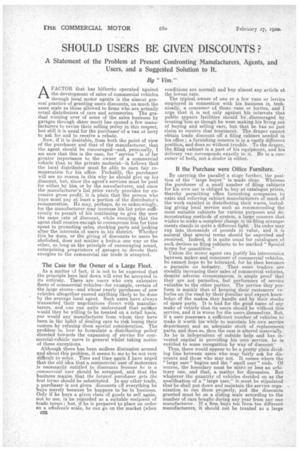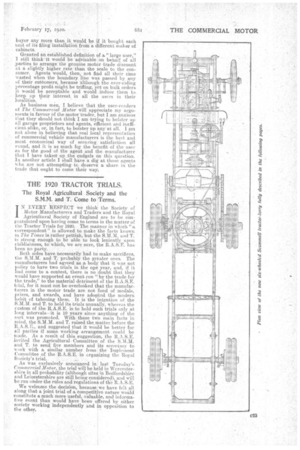SHOULD USERS BE GIVEN DISCOUNTS?
Page 10

Page 11

If you've noticed an error in this article please click here to report it so we can fix it.
A Statement of the Problem at Present Confronting Manufacturers, Agents, and Users, and a Suggested Solution to It.
By "Vim."
AFACTOR that has hitherto operated against the development of sales of commercial vehicle through local motor agents is the almost general practice of granting users discounts, on much the same scale as those allowed to firms who are actually retail distributors of cars and accessories. The gradual winning over of some of the sales business by garages through sheer merit has caused a few manufacturers to 'revise their selling policy in this respect, but still it is usual for the purchaser of a van or lorry to ask for and to receive a rebate.
Now, if it is desirable, from both the point of view of the purchaser and that of the manufacturer, that the agent should he encouraged—and, personally, I am sure that this is the ease, for " service " is of far greater importance to the owner of a, commercial vehicle than to the private motorist—it follows that the local distributor must be able to earn fair remuneration for his office. 'Probably, the purchaser will see no reason in this why he should give up his discount, but, since the agent's services must be paid for either by him or by the manufacturer, and since the manufacturer's list price rarely provides for excessive gross profit; it is. plain that the person who buys must pay at least a portion of the distributor's remuneration. He may, perhaps, do so unknowingly, for the manufacturer may increase his list price sufficiently to permit of his continuing to give the user the same rate of discount,, while ensuring that the agent shall receive enough to recompense him for tune spent in promoting sales, stocking parts and looking after the interests of users in his district. Whether this be done or the giving of discounts to users be abolished, does not matter a button one way or the other, so long as the principle of encouraging .sound, enterprising proprietors of garages to devote their energies to the commercial car trade is accepted.
The Case for the Owner of a Large Fleet.
As a matter of fact; it is not to be expected that the principle herelaid down will ever be accepted in its entirety. There are users who own extensive fleets of commercial vehicles—for example, certain of the large stores—and whose yearly purchases of new vehicles altogether exceed anything likely to be done by the average local agent. Such users have always transacted their negotiations direct with manufacturers, and one can quite understand that neither would they be Filling to be treated on a retail basis, nor would any manufacturer from whom they have been in the habit of dealing care to risk losing their custom by refusing them special consideration. The problem is, hew to formulate a distributing policy directed towards the expansion of service for commercial-vehicle users in general whilst taking notice of these exceptions.
Although there has been endless discussion around and about this problem, it seems to me to be not very difficult to solve. Time and time again I have urged that the old idea that a commercial user of motorcars is necessarily entitled to discounts because he is a commercial user should be scrapped, and that the business maxim that the largest purchaser gets the best terms should be substituted. In any other trade, a purchaser is not given discounts off everything he buys merely because he happens to be in business. Only if he buys a given class of goods to sell again. not to use, is he regarded as a suitable recipient of trade terms ; but, if he is prepared to place an order on a wholesale scale, he can go on the market (when
022 conditions are normal) and buy almost any article at the lowest rate.
The typical owner of one or a few vans or lorries employed in connection with his business is, technically, a consumer of those vans or lorries and I urge that it is not only against his interests that public repairs facilities should be discouraged by
treating him as though he were making his living out of buying and selling cars, but that he has no just
claim to receive that treatment. The draper cannot obtain trade discount off a filing cabinet needed in his office ; a furnishing concern is in a vastly different position, and does so without trouble. To the draper, the filing cabinet is a part of his equipment, and his delivery van corresponds exactly to it. He is a consumer of both, not a dealer in either.
lithe Purchase were Office Furniture.
By carrying the parallel a stage further, the position of the large buyer" is made clear. Whereas the pureha,see of a small number of filing cabinets for his own use is obliged to buy at catalogue prices, thereby permitting office furnishing companies to exist and relieving cabinet manufacturers of much of the work entailed in distributing their wares, including giving local service such as recommending the most suitable cabinets for various purposes and demonstrating methcds of system, a large concern that wishes to make a complete change in its filing arrangements stands in quite a different light. Its order may run into thousands of pounds in value, and it is natural that special terms should be expected and received. Indeed, it is quite usual for catalogues of such devices as filing cabinets to be marked" Special terms for quantities." Unless the motor agent can justify his intercession between maker and consumer of commercial vehicles, he cannot hope to be tolerated, for he then becomes a parasite on industry. That some traders are steadily increasing their sales of commercial vehicles, despite adverse circumstances; is ample proof that they are not parasites, but performers of service valuable to the other parties. The service they perform is mainly that of keeping their customers' vehicles on the road by their peculiar and expert knowledge of the makes they handle and by their stocks of spare parts. It is bad for the good name of, any make of vehicle that its users should be without this service, and it is worse for the users themselves. But, if a user possesses a sufficient number of vehicles to make it worth his while to maintain his own service department and an adequate stock of replacement parts, and does so, then the case is altered materially. As he is independent of outside help and has invested capital in providing his own service, he is entitled to some recognition by way of discount.
Thus, there would appear to be a pretty plain dividing line between users who may fairly ask for discounts and those who may not. It comes where the "large user" begins and the "small user" ends. Of course, the boundary must be more or less an arbitrary one, and that, a matter for discussion. But whatever the quantity of vehicles decided on 'as the qualification of a "large user," it must be stipulated that he shall put down and maintain the service organization to run them properly, and the discounts granted must be on a sliding scale according to the number of cars bought during any year from any one manufacturer. If a firm buys ten from ten different manufacturers, it should not be treated as a large
buyer any more than it would be if it bought each unit of its filing instalratiori from a different maker of cabinets.
Granted an established definition of a "large user," I still think it would be -advisable on behalf of all ,parties to arrange the genuine motor trade discount at a, slightly higher rate than the scale to the consumer. Agents would, then, not find all their time wasted when the boundary line was passed by any of their cut-to-mere, because although the over-riding percentage profit might be trifling, yet on hulk orders it would be acceptable and would indfiee them to keep up their interest in all the users in their localities.
As business men, I believe that the user-readers of The Commercial Motor will appreciate my argu. meats in favour of the motor trader, but I am anxious that they should not think I alp *yin to bolster up all garage proprietors and agents, efficient and inefficient alike, or, in fact, to bolster up any at all. I am i
not alone n believing that real local representation of commercial vehicle manufacturers is the best and most economical way of securing satisfaction ail round, and it is as much for the benefit of the user as for the good of the agent and the manufacturer that I have takeit up the cudgels on this question. in another article I shall have a dig at those agents who are not attempting to deserve a share in the trade that ought to come their way.
THE 1-920 -TRACTOR TRIALS. The Royal Agricultural Society and the
S.M.M. and T. Come to Terms.
IN EVERY RESPECT ime think the Society of Motor Manufacturers and Traders and the Royal Agricultural Society of England are to be congratulated upon-having come to terms in the matter of the Tractor Trials for 1920. The manner in which "a correspondent" is allowed to make the facts known . in The Times is rather pettish, but the S.M.M. and T. is strong enough to be able to look leniently upon childishness, to which, we axe sure, the R.A.S.E. has been no party.
Both sides have necessarily had to make sacrifices, the S.M.M. and T. probably the greater ones. The manufacturers had agreed as a body that it was not polity to have two trials in the ope year, and, if it had come to a contest, there is no doubt that they
would have supported an event run "by the trade for the trade," to the material detriment of the R.A.S.E, trial, for it must net be overlooked that the manufacturers in the motor trade are not fond of medals,
prizes, and awards, and have adopted the modern habit of tabooing them. It is the intention of the S.M.M. and T. to hold its trials annually, whereas the custom of. the R.A.S.E. is to hold -such trials -only at long intervals—it is 10 years since anything of the sort was promoted. With these two main facts in mind, the S.M.M. and T. raised the,matterbefore the R.A.S.E., and suggested that it would be better for all parties if some working arrangement could be made. As a result of this suggestion, the R.A.S.E. invited the Agricultural Committee of the S.M.M.
aud T. to send five members and its secretary to work with a.. similar number from the Implement Committee of the R.A.S.E. in -organizing the Royal Society's trial.. . .
As was exclusively announced in last Tuesday's Commercial Motor, the trial will be held in Wercester
shire in all probability (although sites in Bedford-shire
a-nd Leicestershire are still being considered), and will be run under the rules and regulations of the R.A.S.E. We welcome the decision, because we have felt all along that a joint trial of a Competitive nature .woild constitute a much more useful, valuable, and informative event than would have beenoffered by either society working independently and in opposition to the other.




























